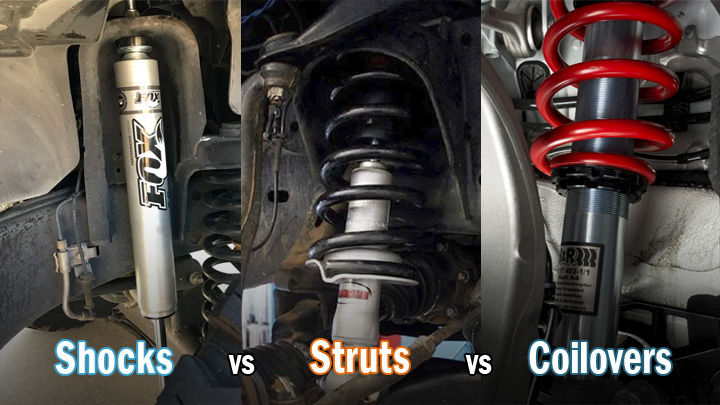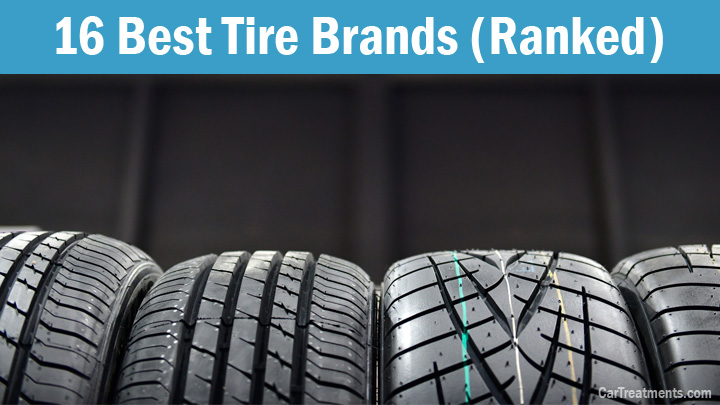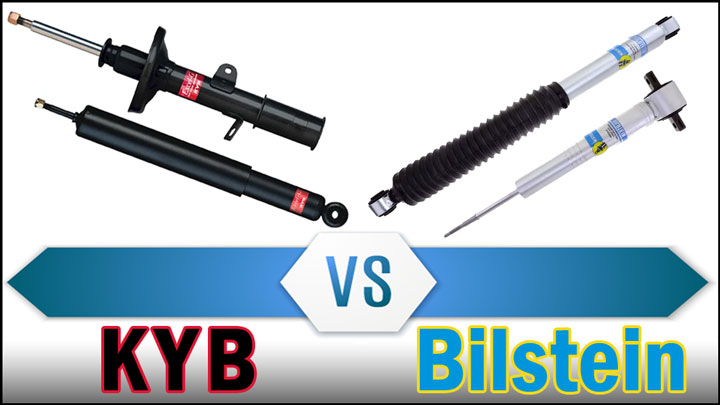Last Updated on November 30, 2021
Suspension components are the second most important feature of your car. They are the messenger between the tires and your brain giving you confidence that your car will behave the way you want.
Suspension determines whether your car will oversteer (turn too much) or understeer (turn too slowly). It decides whether your car will feel comfortable going up a gravel road or if you will be able to avoid the driver that isn’t looking as they move across four lanes of traffic with no turn signal.
Now, we can’t help that BMW only offers turn signals as a $5000 add-on, but we can make sure that our suspension components are working, and that we know the variants and their purposes!
However, you may have some confusion about shocks versus struts or maybe someone mentioned you should upgrade to coilovers. Keep reading to see how these three suspension components compare.
What Are Shocks?

Think of your shocks as the suspension manager. They control how quickly your spring compresses and help manage the heat produced by the fluid in your shocks moving around.
When your car is at rest, it will have the best possible contact patch and your shocks won’t be doing anything. However, when you take that sick Ford Raptor off of some sweet jumps, the rate at which your springs compress will be helped and dampened by your shocks.
There are big shocks, small shocks, performance shocks, and economy variants. They all have a slightly different application but all pretty much do the same thing.
Your Honda Civic is going to have a basic economy shock with little travel, but might cost 50 bucks out the door at your local auto parts store. On the other hand, you can get KING suspension components with extra long travel, external reservoirs that will let you compete in the BAJA 1000 race.
If you are looking to compare and contrast shock manufacturers, many start their search with KYB vs Monroe or Bilstein vs KYB, but other brands (Gabriel, Koni, FOX, Rancho, etc.) are worth considering as well.
What Are Struts?

Struts bear the brunt of your car’s suspension workload. Think of them as the underlings, as they are tasked with holding the full weight of your vehicle’s respective corner, allowing it to go up and down with the road conditions.
With struts, your shocks are normally located inside of the strut assembly, with the spring coiling around the strut as it compresses during normal operation. Your struts are important as they control almost all of how your car behaves as it goes down the road.
You should take a good look at your struts every 60-80k miles and even sooner if you live in a salty area or you overload your vehicle often. The harder they work, the quicker they burn out!
Related: Strut Mount Replacement Cost
What Are Coilovers?

Coilovers and Struts are words sometimes used interchangeably when describing the same exact thing. The “Coil” goes “Over” the shock, that’s basically what a strut is, no? Well, not exactly.
Coilovers are struts where the spring coils around and over all the way up to the top. The only difference here is that coilovers generally offer more adjustability in the way of ride height, dampening, and also allow the user to switch out springs for a more-custom spring rate.
I like to think of “struts” as the OEM option many manufacturers fit to their vehicles, whereas coilovers are usually reserved for high performance variants or tuner cars that you see flying by on your commute home.
All in all, your suspension is important, as it controls how you interact with your car and the road ahead of you. Make sure you check today if your car needs new shocks, struts, or coilovers. You may be surprised at their replacement cost.





Have a 2019 Toyota Corolla SE it just started squecking pulling in driveway going over railroad has over 56 thousand miles never had a problem before .
Can you tell where the noise is coming from? Could something be caught in the wheel well or underneath the car?
Could you describe the sound in more detail?